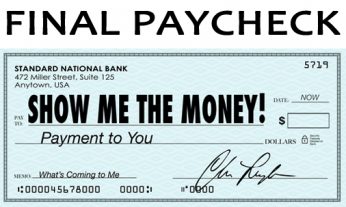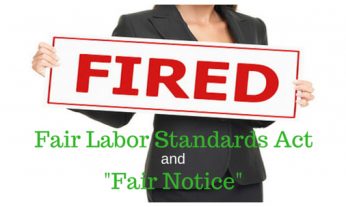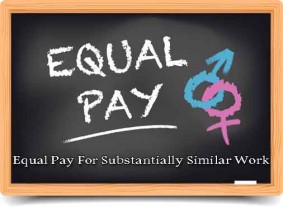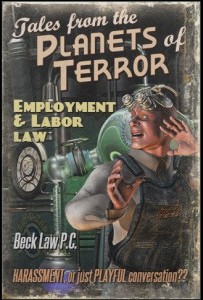 When can I expect to receive my final paycheck? Dissatisfied with your employment situation, you look for another job, providing your current employer with two weeks’ notice. You expect your final paycheck On the last day of employment along with unused vacation and sick pay. You are told, however, that payment will be deferred until the end of the pay period. So you scratch your head and wait for the check. Ten days later when it comes, the paycheck includes payment for the hours you worked, but nothing more. Where is the compensation for unused vacation and sick days?
When can I expect to receive my final paycheck? Dissatisfied with your employment situation, you look for another job, providing your current employer with two weeks’ notice. You expect your final paycheck On the last day of employment along with unused vacation and sick pay. You are told, however, that payment will be deferred until the end of the pay period. So you scratch your head and wait for the check. Ten days later when it comes, the paycheck includes payment for the hours you worked, but nothing more. Where is the compensation for unused vacation and sick days?
What now? This is precisely the type of question that an experienced employment lawyer can assist with.
Was I Entitled to my Final Paycheck on the Last Day I was Employed?
In this situation, the answer is yes. The employee’s final paycheck is due within 72 hours of termination if the employee leaves without notice. The check may be picked up at the office or mailed to a designated address. If notice was given 72 hours or more prior to leaving, as in this case, the final check is due at the time of termination and at the location of the employer’s office.
What About Unused Sick Days and Vacation Days?
Earned, unused vacation pay must be included in the final payment. The same is not true for unused sick leave, however. Unless your contract says otherwise, California law does not ensure payment for these unused days.
Can Penalties Be Assessed if I am Forced to Wait for My Final Paycheck?
California law provides for employees who were discharged or who quit to be reimbursed at their daily wage for up to 30 days if an employer willfully fails to pay the earned wages in the time frame outlined. In this case, the 10 days of waiting may qualify for penalties. Also, the failure to pay out the unused vacation days may result in additional penalties. In Mamika v. Barca (1998) the court determined that the penalty would be calculated based on the monthly wage rather than at the daily rate for 30 days, which resulted in a slightly lower penalty.
Am I Entitled to Severance Pay?
California law does not require employers to provide severance pay, although many companies do have their own contractual obligations. It is important to examine your contract with regard to this matter.
Can I Collect Unemployment While Looking for a New Job?
All employers must pay unemployment insurance, which covers employees except in certain circumstances. In this case, you quit your job. Unless you can demonstrate good cause for quitting, you are likely ineligible for unemployment benefits. [Read more…]









